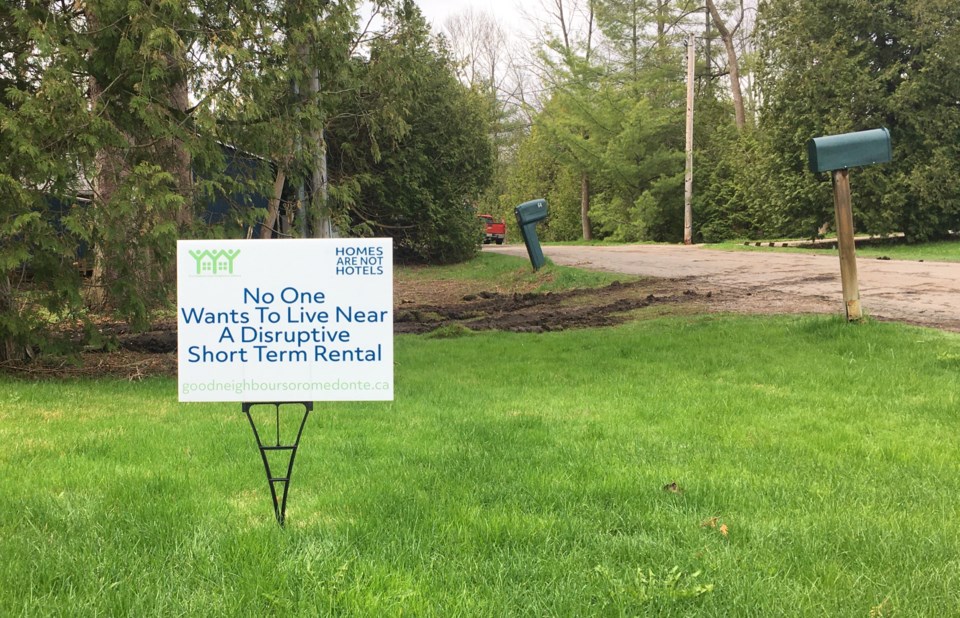One of Oro-Medonte's top staffers got right to the point on short-term rentals (STRs) at the township’s council meeting Wednesday afternoon.
“Short-term commercial accommodations within the township are not a permitted use under the zoning bylaw,” George Vadeboncoeur, manager of planning special reports, said during his presentation of an information report.
The report formally updated council and the community on the background and actions taken on the STR issue since it was first identified in 2017.
“Those are short-term commercial accommodations that are used for financial gain or to turn a profit,” Vadeboncoeur said. “They’re not permitted under the zoning bylaw. Township staff will be looking at ways that we can proceed to advise council on the best way to enforce that moving forward.”
Vadeboncoeur said township staff will continue to enforce the zoning bylaw and will be returning to council sometime over the next few weeks with an options report that will detail how the municipality can move forward “based on the lessons that we’ve learned through the decision of the Ontario Land Tribunal (OLT) and the court system.”
On March 22, Oro-Medonte Township and the Oro-Medonte Good Neighbours Alliance’s appeal of an Ontario Land Tribunal (OLT) decision regarding short-term rental accommodations in the municipality was dismissed.
The Ontario Superior Court of Justice said it dismissed the appeal because there was no procedural unfairness; the OLT was correct in its interpretation of the existing zoning bylaw and made no error in law in finding the 2020 bylaw did not represent good planning.
“It’s unfortunate it’s taken so long to get to this point, but I think we have, now, some guidance, that from a staff perspective that we can work with and move forward,” Vadeboncoeur told council.
According to Vadeboncoeur, what the OLT, and by extension the courts, said is that the current wording in the zoning bylaw, which indicates that a 'commercial accommodation' is not permitted in a dwelling unit, is sufficient for the township to pursue those activities that meet the standard of a commercial accommodation. It also provided some guidance about what those standards may be.
“It needs to be more than just a receipt,” he said. “It has to be something that is operating akin to a motel or some other sort of commercial accommodation.
“That’s where we are today,” Vadeboncoeur added.
In an effort to provide clarity and ensure everyone was on the same page, Coun. David Clark offered a summation of what he had heard.
“If I may try to sum up the position of council, quickly, is to use the tools that are available to us as a municipality of lower form of government in order to enact what we believe are our bylaws,” Clark said. “So we’re looking for creative strategies in order to enforce the bylaws that we believe that are within our jurisdiction?”
“Correct,” said Mayor Randy Greenlaw. “I think that’s where some of the challenges and confusion is, because I know the previous council did go to the province and ask them to step in and assist with this matter.
“We were told that you have the tools in your toolbox to do it and there’s no need for the province to engage any further, but when we’ve used our tools within our bylaws, we’ve been, kind of, told no," the mayor added.
Greenlaw said his understanding, from when the townships of Oro and Medonte merged, was the zoning bylaws did not list temporary accommodations or short-term rentals in any of the residential zones within the township.
Brent Spagnol, director of development services, confirmed the mayor’s understanding.
“Yes, that’s correct,” Spagnol said. “There were only specific areas that the zoning bylaw identified where these would be permitted. Not as a general permitted use in any residential zoning."
The mayor wondered aloud how the township would move forward without litigation and more time spent in the courts.
Greenlaw also said STRs "have a place in this society," but they need to be in zones where it promotes tourism.
“Unfortunately, it changes the character and safety within residential zones and that’s one of the key pillars of the Planning Act and our responsibility as a council is to provide safe communities and neighbourhoods to our residents," Greenlaw said.
